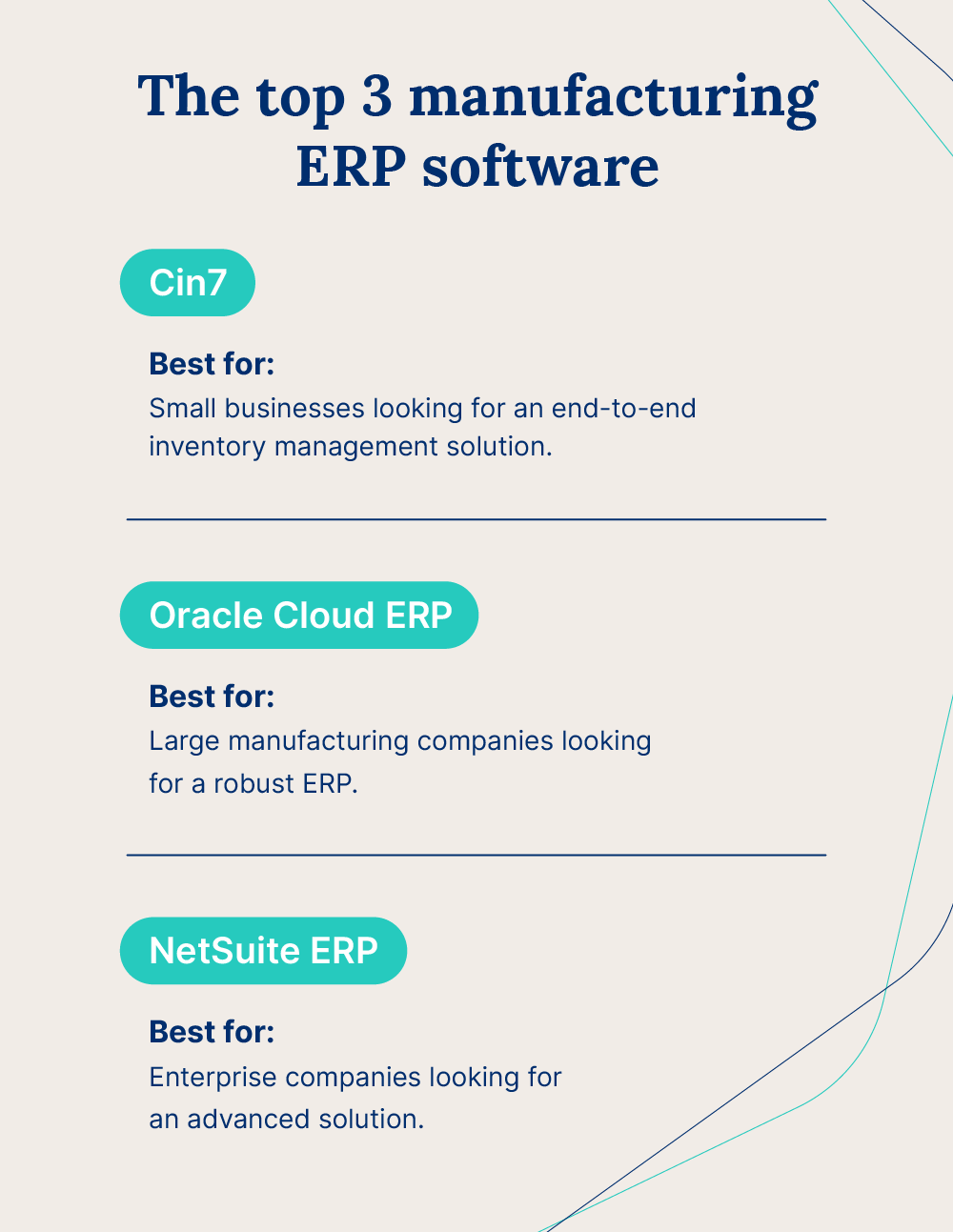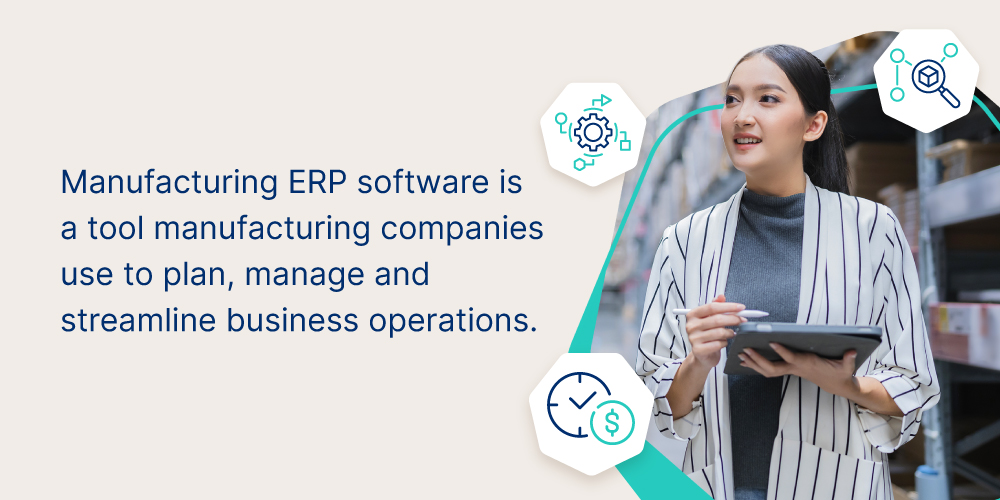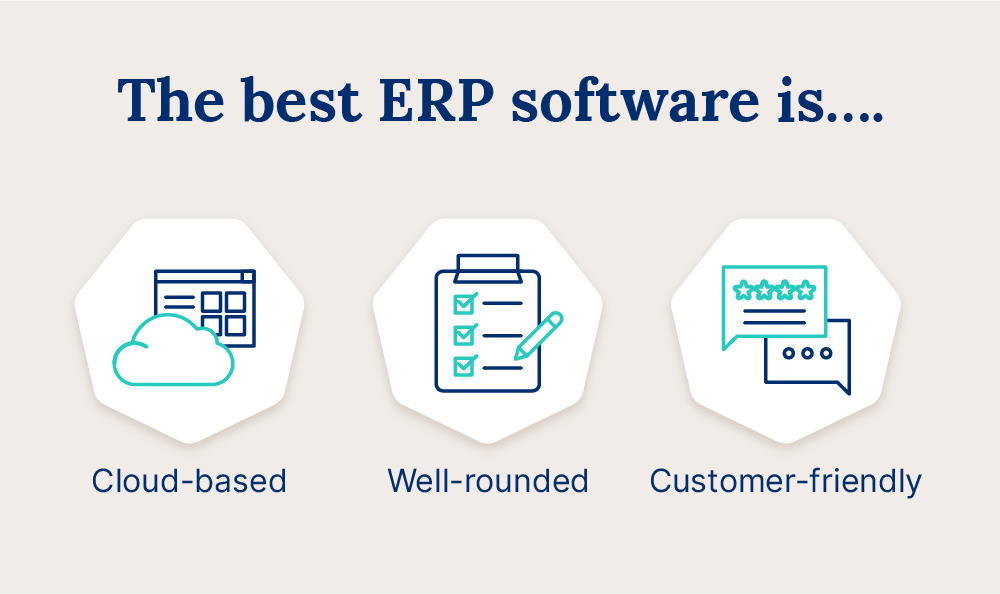

Enterprise resource planning (ERP) software is often described as the central nervous system of a company. While you may be skeptical of this comparison, it makes sense.
Like the central nervous system controls the human body and mind, ERP systems use business intelligence to regulate a company’s operations — centralizing the core processes that spur company growth and success.
Manufacturing ERP software helps a company with every aspect of its business operations, from accounting to finance, procurement, supply chain management, HR, and more. And with modern ERPs operating predominantly through cloud-based technology, it’s easier than ever to take the manual work out of running a business, so you can focus more on growing it.
With technology like this readily available, small business owners can benefit significantly from cloud-based ERP software, but these systems aren’t one size fits all.
In this post, we’ll break down the 21 best manufacturing ERP software solutions, who they’re best for, some pros and cons, and what you should look for when selecting a manufacturing ERP software.
Methodology: To create our list, we considered ease of use, features and functionality, specializations, customer support, and cost.
Best manufacturing ERP of 2023:

Best for: Small to midsize businesses looking for an easy tool to maintain that’s quick to get up and running
While traditional ERPs can often be expensive and complicated, Cin7 makes enterprise planning simple and affordable. Perfect for small to mid-sized businesses, Cin7 only takes a few weeks to implement — unlike some systems that take months.
Despite being accessible and easy to use, Cin7 doesn’t sacrifice the advanced features and automation that make ERPs a worthy investment for businesses of any size. By centralizing sales, reporting, accounting, and HR in one place, Cin7 eliminates the chance of manual error in company processes through automation. And most importantly, it empowers product sellers to do what’s most important: grow their business.
Request a demo or trial of our ERP and small business Inventory Management software today
Best for: Large manufacturing companies looking for an ERP with robust capabilities
While Cin7 is best for small and mid-sized businesses, Oracle Cloud ERP speaks more to large companies looking for a more advanced tool with features specific to the enterprise level.
Large brands like Chipotle, Cisco, and FedEx use the Oracle Cloud ERP because it understands how to manage and scale with large companies — making it a good choice for any enterprise company looking for a change in their ERP provider.
Best for: Large corporations looking for a customizable ERP solution
Owned by Oracle, Netsuite’s ERP solution is a solid choice for large-scale manufacturers looking for a centralized platform for production management, supply chain management, sales, and more.
A top choice for global businesses, NetSuite’s ERP allows you to keep tight control over your business operations even as it starts to expand globally. As your business grows and sells more and more products, there’s no room for error — and a product like NetSuite ensures manual error won’t slow down business growth.
Best for: Small manufacturing companies looking to emphasize supply chain sustainability
SAP Business One’s major appeal to customers is its emphasis on sustainability in the supply chain, as its software has one of the highest Environmental, Social, and Governance scores (ESG) in the software industry.
Beyond sustainable practices, SAP offers simple-to-use features for small manufacturers, allowing them to easily integrate customer management, sales, accounting, and more in the same place.
Best for: Small to mid-size manufacturers looking for easy-to-use software
xTuple offers a one-price approach, meaning all customers receive the same product for the same price. This system builds customer trust by ensuring they don’t get overcharged. Still, the system also limits xTuple’s ability to tailor their product to specific customer needs.
The product itself, however, is a solid choice for small to mid-size manufacturing companies looking to scale their business. With numerous solutions and integration features, business owners can focus on growth instead of day-to-day operations.
Best for: Retailers and wholesalers looking for a centralized ERP platform
For retailers and wholesalers looking for more visibility into the production cycle, ERPNext is an effective solution. ERPNext speaks especially to business owners wanting more control over the production cycle — allowing users shop floor visibility and integrated purchasing, accounting, and financial reporting.
Additionally, ERPNext includes a subcontracting feature for retailers that outsource to suppliers. With the subcontracting feature, you can easily view your supplier’s operations and manage your retail.
Best for: Small and mid-sized companies currently using the Microsoft Suite
Microsoft Dynamics 365 is especially appealing to current Microsoft customers as the ERP easily accesses other Microsoft tools, like Excel, other 365 products, Power BI apps, and more.
Designed to work together with your existing systems to maximize efficiency, Microsoft Dynamics 365 is an excellent solution for businesses drowning in spreadsheets and looking to take manual work out of the day to day.
Best for: Small to midsize businesses
An affordable option for small businesses, Striven provides companies with a comprehensive platform with features for accounting, HR, CRM, and more.
Striven also offers companies a variety of business management features, including a calendar hub, social media integration, an internal news feed, and more. The tool also integrates with Google Calendar, so you don’t have to worry about shifting internal operations to a new system.
Best for: Smaller manufacturers looking for a comprehensive solution
Acumatica differentiates from competitors by offering certain features that other manufacturing ERPs don’t, like field service, service management, and project accounting modules.
Acumatica strives to adapt to changing technology to stay ahead of the curve. The tool offers an augmented reality feature, virtual reality, AI, and IoT to add the most modern technology to its ERP.
Best for: Young companies using an ERP for the first time
SYSPRO appeals primarily to young and growing manufacturing and distribution companies as it allows you to purchase the tool in modules and add more as you need them. As a result, companies can purchase the exact module that fits their current business needs and increase as the company grows and shifts.
As a young company, your needs will fluctuate regularly. SYSPRO’s modular framework is great for young companies experimenting with an ERP for the first time.
Best for: Manufacturers looking to create a more efficient distribution process
Epicor Prophet 21 aims to streamline the distribution process for manufacturers, offering beneficial modules including warehouse management, inventory modules, supply chain management modules, and more.
Epicor Prophet 21’s warehouse management module includes multiple features that can significantly improve the distribution process. Offering barcoding, label printing, and more, Epicor Prophet 21’s library of modules is a reliable tool for manufacturers looking to boost efficiency in current processes.
Best for: Enterprise-level manufacturing companies looking to streamline manufacturing processes
For manufacturing companies tasked with juggling lots of moving parts, Infor Syteline is a solid choice for maximizing efficiency. With features ranging from quality control to planning, scheduling, and more, Infor Syteline’s platform can be great for manufacturing companies looking for a tool with a complete set of features.
Infor Syteline lends itself more to companies with complex manufacturing processes — which makes it less relevant for small and mid-size companies. For large companies looking to move to a new ERP that can adapt to their complex processes, Infor Syteline is a strong choice.
Best for: Manufacturers looking to centralize finance and accounting
Sage Intacct’s strength is as a financial management software, making it an excellent choice for manufacturing companies looking to automate monotonous finance tasks to improve efficiency and reduce the chance of manual error.
Sage Intacct provides detailed financial reports that give you insight into your business performance, so you can see your exact bottom line. Beyond that, the software additionally prioritizes security, so you never have to worry that your financials are at risk.
Best for: Manufacturers looking for an end-to-end solution
IFS Cloud offers a range of industry-specific solutions for businesses in a variety of different verticals, including manufacturing, aerospace and defense, telecommunications, and more.
For manufacturers, IFS Cloud tailors its product specifically to automotive, chemicals, food and beverage, high-tech manufacturing, industrial manufacturing, and life sciences. IFS Cloud can be a great option for streamlined inventory management for businesses in these verticals.
Best for: Manufacturers looking for a customizable ERP
Odoo is unique because it’s an open-source ERP, meaning that developers can build apps directly within the solution. As a result, Odoo is constantly growing and evolving with new apps and features.
Beyond the open-source framework, Odoo provides an all-in-one solution for manufacturers looking to centralize their business operations. Doubling as a CRM, Odoo makes it easy for businesses to manage customers, processes, and more.
Best for: Manufacturers looking for more plant floor visibility
Plex ERP works especially well for manufacturers who are looking for a centralized view of all parts of their operation — from the plant floor to the c-suite.
Plex ERP’s smart manufacturing platform automates business processes and tracks data so business owners can make more informed decisions. Plex ERP lets manufacturers focus solely on growth by automating tasks and connecting processes in a single system.
Best for: Batch and process manufacturers
A solid choice for startups and growing manufacturing companies, Deacom provides a system that reduces time spent on manual processes and simplifies complex manufacturing processes.
Used primarily by process manufacturers and distributors, like food and beverage companies and cosmetics companies, Deacom thrives in creating process control so that companies can build efficient and repeatable processes.
Best for: Manufacturers looking for a customer-first software solution
Global Shop Solutions is one of the more approachable companies on our list as a family-owned business operating out of Houston, Texas. Their comprehensive solutions streamline production, finance, and order management into a single solution, making it easy for manufacturers to view all their operations.
Able to track shop floor data and forecast changing market trends, Global Shop Solutions is designed so business owners can focus on growing their businesses instead of managing operations.
Best for: Enterprise manufacturing companies that see regular demand fluctuations
QAD Systems appeals to companies that they deem “adaptive enterprises.” These companies regularly see demand swings and market shifts — either from macroeconomic changes or general market instability.
QAD Systems strives to be the best software for companies that regularly need to adapt to new demand planning and changing market conditions.
Best for: Enterprise food and beverage companies
While Aptean has solutions tailored to companies in a variety of verticals, food, and beverage is their bread and butter.
Named the Customer Value Leader in Food and Beverage ERPs by market research Frost and Sullivan, Aptean offers solutions for different segments within the food and beverage industry, like bakeries, beverages, and produce — to name a few. With solutions tailored to whatever food and beverage vertical you’re in, Aptean will likely fit your needs.
Best for: Small and mid-sized businesses looking to streamline distribution processes
Aquilon’s manufacturing ERP rounds out our list — a solid choice for small to mid-size manufacturers looking for integrated manufacturing, distribution, and financial management.
Claiming to be easier to use than competitor software, Aquilon appeals to small businesses as a simple and customer-centric solution. Aquilon can be an effective choice for young companies ready to invest in their first ERP.

ERP means Enterprise Resource Planning, which describes an organization’s system or software to plan and manage business operations.
The best manufacturing ERPs aim to seamlessly integrate into a company’s processes and centralize them into a single source of truth, thus streamlining operations and bolstering productivity.
When it comes to manufacturing, the most effective ERPs are typically able to:
The benefits of an ERP are plentiful, and although you may be able to accomplish these tasks yourself, an ERP’s greatest advantage is the time it gives back to you to grow your business.

Manufacturing ERPs should check a few essential boxes. When selecting an ERP software, be sure you’re looking for a tool that is:
Cloud-based solutions have largely replaced on-premise solutions as the ideal way to manage resources — and rightfully so. While on-premise software runs on a company’s hardware, cloud-based solutions run on the provider’s servers — making them accessible through a web browser.
Because of the ease of use, cloud-based solutions are a more robust option than on-premise solutions. This technology reduces labor and time spent on resource planning through automation and increases agility, giving you the time and freedom to grow and scale your business.
Before you select software, consider your needs. Are you just looking for supply chain management? Or do you need HR, sales, finance, accounting, and more centralized in a single platform?
Resource management is a headache, so your goal should be finding software that allows you to not think about it. As a result, make sure you’re looking for well-rounded software that accounts for all your business needs.
Software companies won’t, and shouldn’t, expect you to be experts in their software right after you buy it. And even the most straightforward software can be difficult to implement and use right off the bat.
When browsing software, look at companies that offer a thorough onboarding process and dedicated customer support. This not only helps you quickly get your team up to speed on how to use the platform, but it also helps you to get the most out of the service.
Still have questions about the importance of ERP software? We’ve got you covered. Here are some common questions and answers about everything ERP.
ERP stands for “Enterprise Resource Planning” in manufacturing. It refers to a system of organizing all resources and processes related to manufacturing, like shipping, financial management, supply chain management, and more.
ERP is important because it can be essential in helping businesses grow. ERPs work to maximize efficiency in an organization and bolster productivity, so your company can gain more customers and revenue.
The cost of a manufacturing ERP system depends on the number of users, the type of software, the included features, and more. As a result, the software can range from free basic plans to upwards of $10,000 per month for the most advanced plans.
While MRPs focus exclusively on manufacturing, ERPs streamline broader organizational processes along with manufacturing processes, like accounting, HR, finance, and sales.
The best manufacturing ERPs are tailored to your business needs, easy to use, equipped with great customer support and onboarding processes, and adaptable. Your ERP should grow as your business grows, so it’s crucial to find a system designed to scale with you.
At Cin7, we know growing a small business is no easy task. Our ERP and inventory management software takes the headaches out of your usual day to day, letting you focus on driving growth.
Start your free trial today to see Cin7 in action.

If you’ve been hanging around the accounting department, chances are you’ve heard the term cost of goods sold (COGS) thrown around a few times. But while COGS is important, it’s also a concept people tend to misunderstand. Knowing what COGS is will help you better understand all of the costs associated with your product and […]

Manufacturing lead time is the time it takes to manufacture a product and then deliver it to a customer. In a nutshell, it reflects how long the customer needs to wait to receive what they ordered. We all know the excitement of waiting for a package to arrive — and the confusion and disappointment when […]

A bill of materials (BOM) is an extensive list of raw materials and components required to manufacture or repair a product or service. BOMs are designed in a format that keeps the finished product at the highest level and the other individual components and materials at the bottom. Ever been halfway through making a pizza […]